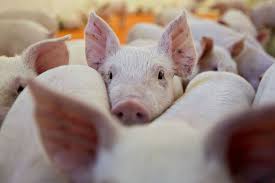The African Swine Fever (ASF) virus may have came to China from the European Union, Russian agriculture safety watchdog said last Tuesday, citing results of its own research.
上周二,俄罗斯农业安全监督机构援引其研究结果称,非洲猪瘟病毒可能是从欧盟传入中国的。
The U.N. Food and Agriculture Organization (FAO) said around 40,000 hogs had so far been culled in China in an attempt to stop the disease from spreading through the world's largest pig herd.
联合国粮农组织之前表示,迄今为止中国已宰杀了大约4万头猪,以防止猪瘟在中国这个全球最大的养猪国家传播。
"The first and most probable (version) is an import of the virus to China from one of the European Union countries, taking into account the highly developed trade in agricultural products, including supplies of pork products between China and the EU," the Russian watchdog said in a statement.
俄罗斯监管机构在一份声明中称:“考虑到中国与欧盟之间高度发达的农产品贸易,包括进口猪肉产品,病毒最有可能的传播途径是从欧盟国家通过进口猪肉传入到中国。”

China could also have got the virus from wild boars of the South Caucasus region but the likelihood of this scenario is low, Russia's Rosselkhoznadzor added.
俄罗斯农业机构Rosselkhoznadzor补充称,中国也可能是从南高加索地区的野猪身上得到的这种病毒,但这种可能性很低。
Russia, which shares part of its border with China, and its neighbors have also seen several ASF outbreaks this season. Last week, Moscow said it could ban pork imports from Belarus after it found ASF in some meat products.
与中国接壤的俄罗斯及其邻国本季度也发生了数次非洲猪瘟疫情。上周,在发现部分肉制品中含有非洲猪瘟病毒后,莫斯科表示禁止从白俄罗斯进口猪肉。
The rise in pork prices in Russia in July-August was caused by ASF outbreaks among other factors. The virus is a highly contagious fever among pigs, but it is not dangerous to humans.
由于非洲猪瘟爆发等因素,俄罗斯7月至8月的猪肉价格上涨。非洲猪瘟病毒在猪群中具有高度传染性,但对人类无害。












